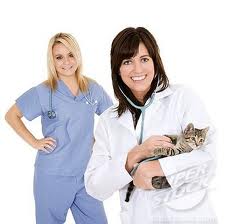
Bloat or GDV is a heart breaking condition that we deal with in our Melbourne 24Hr Pet Emergency Centres. The following article was prepared by Dr Emily Treweek. Dr Treweek has worked in emergency and critical care for the last 10 years and is a Member of the Australian and New Zealand College of Veterinary Scientists in Emergency and Critical Care. If at any time you believe that your pet may have bloat, we need to see them as soon as possible. We are a 24 Hr Melbourne Animal Hospital. We are open 7 days a week and we are a Vet Open Sunday. Our Team are always available.

Gastric Dilation and Volvulus (or GDV as we will refer to it) is a life-threatening emergency where the stomach dilates with gas, and rotates within the abdomen, often 180 degrees, sometimes 360 degrees. Normal build up of gas can be relieved by burping, however the rotation (‘volvulus’) starts near where the stomach meets the oesophagus, preventing burping. The blood flow to the stomach is compromised, as the vessels are crushed when the stomach twists. The spleen is an adjacent organ that may become tangled also. Compromise to the blood flow causes inflammation due to reduced removal of waste from the cells of the trapped organs. The stomach can get so big that it disrupts blood flow from the back end of the body to the heart, leading to reduced blood pressure, which leads to reduced blood supply to the rest of the body. The size of the stomach can put pressure on the diaphragm, making it hard for the pet to breathe. In turn, this can reduce the amount of oxygen available to the body.
With reduced blood pressure, reduced oxygenation and inflammation, it is easy to see how this can make a pet critically ill, and all of this can occur within only hours.
Symptoms of gastric dilation and volvulus may include an acute onset of discomfort, restlessness , salivation, retching or attempting to vomit, unproductively. If you ever notice these symptoms, you must have your pet seen promptly by a veterinarian. It will help if someone can call ahead so the veterinary team can be prepared.
It is a condition most often seen in large breed, deep chested dogs. Deep chested dogs will have a very tall chest from their spine to their sternum (breastbone) while having a very narrow chest in the left-to-right dimension. Some examples of dog breeds often affected are Great Danes, greyhounds, Irish Setters, Standard Poodles, St Bernards and Weimeraners, although any breed of dog, and even cats can occasionally be affected.
While there has been much speculation on the cause of GDV, there is little evidence to support what the cause may be. Having a first degree relative with GDV, anxious or stressed dogs, eating very fast and having a raised feeding bowl are some factors that may be associated.
When presented with a patient with GDV, our veterinary team are required to act quickly. Initial tests include clinical examination including palpation (feeling) the abdomen, blood tests and in most cases xrays (which can confirm whether the stomach is rotated rather than simply dilated). Treatment requires the team to move swiftly to decompress the stomach, stabilize the patient with rapid intravenous fluids, pain relief and sometimes medication to stabilize the heart, in order to get the patient to surgery as fast as possible, where we are able to de-rotate the stomach and assess for damage in the abdomen. In some cases parts of the stomach wall may need to be removed due to permanent loss of blood supply. The spleen sometimes requires removal due to loss of blood supply also. During the surgical procedure, the veterinarian will also perform a gastropexy, which is where the stomach is attached surgically to the inner abdominal wall, to significantly reduce the recurrence of GDV.
As you can probably imagine, it can take a few days to recover from such a major operation. Patients are critical and require 24 hour monitoring for the next few days. The veterinary team needs to treat the patient to ensure optimal hydration, oxygenation and circulation in the postoperative period. The patient will be monitored for blood loss, blood clotting problems, heart problems (detected via ECG) and other complications from surgery. They may need blood or plasma transfusions, medications to reduce abnormal heart beats, improve blood pressure or electrolyte supplementation. Getting the pet to eat again after surgery often requires medication to promote movement of the gut, medication to reduce stomach acid and carefully balanced pain relief. Pets that do well through to stitch removal go on to lead a normal healthy life.
Survival depends on the amount of internal damage. One of the advancements in recent years is the ability to monitor progress with Cage Side Testing. Our Emergency Centres are equipped with the latest blood testing machines, which allows us to obtain blood results acutely. We treat numerous GDV patients each year and are more then aware of the complications that can occur.
If you believe that your pet may have Bloat or a GDV, then you need to contact us directly. We have two convenient emergency centers. Our Emergency Centres run 24Hr Intensive Care Units. We service many suburbs in Melbourne.
Animal Accident & Emergency Essendon – 9379 0700
Animal Accident & Emergency Point Cook – 8368 7400

http://www.animalemergency.com.au/home-1.html





